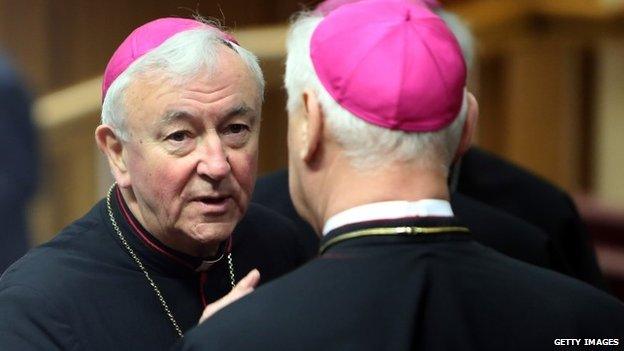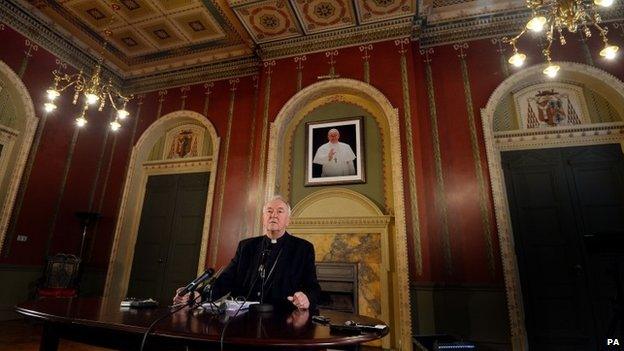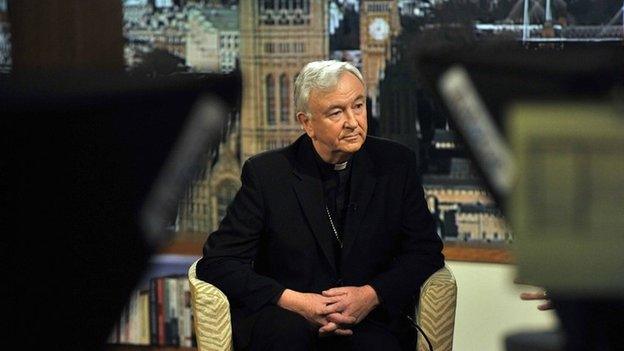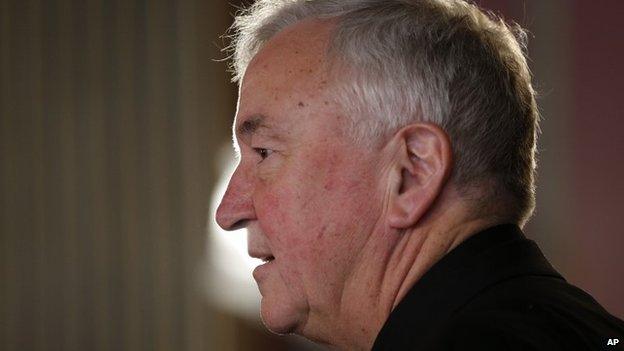Profile: Archbishop Vincent Nichols
- Published

He was the boy who wanted to be a lorry driver who grew up to become the leader of the Catholic Church in England and Wales.
Archbishop Vincent Nichols of Westminster has now been appointed to the elite of the Church by Pope Francis.
He has been seen at times as a "liberal" figure whom opponents accused of supporting civil partnerships and gay-friendly Masses in London.
However, he has publically opposed gay marriage, saying in 2012, that the government plans for it were a "shambles", while fighting against plans for a quota of non-Catholics in RC schools.
The gay-friendly Masses at at Our Lady of the Assumption Church in London's Soho were discontinued in January 2013 after six years.
More recently he highlighted the plight of the poor by attacking the government's welfare reforms.
Archbishop Nichols warned the reforms were leaving people in "destitution" by the removal of a "safety net" and labelled the situation a "disgrace".
However, Deputy Prime Minister Nick Clegg hit back, calling the archbishop's comments an "exaggeration".
The son of two teachers, the future Church leader was born in Crosby, Liverpool in 1945, and has spoken previously of feeling a calling while standing on the terraces at Anfield.
The life-long Liverpool FC supporter told The Times, in 2007: "I'd gone to watch Liverpool and stand on the Kop at Anfield, and say to God 'Why don't you just leave me alone? Why can't I just be one of a crowd?'," he said.
The future Cardinal Nichols studied for the priesthood in Rome from 1963 to 1970 and was ordained as a priest in 1969.
His first role was as a parish priest in Wigan, where he was also a chaplain to a sixth-form college, before he then moved to work in Toxteth, Liverpool.
He became the general secretary of the Bishops' Conference of England and Wales in January 1984.
He occupied the influential post for nine years, earning a reputation as a dynamic administrator and working closely with the then archbishop of Westminster, Cardinal Basil Hume.

In 1992 he moved as auxiliary bishop to the Archdiocese of Westminster, taking on special pastoral responsibility for north London.
He also played a key role in the production of the Common Good document, in 1996, in which the Catholic bishops condemned the rhetoric of greed.
He might easily have taken the top job in the Roman Catholic Church in England and Wales nine years before he eventually did.

In early 2000, some Roman Catholics saw the Auxiliary Bishop in Westminster as the most likely successor to Cardinal Basil Hume, who died in 1999.
Instead, Pope John Paul II chose the long-serving Bishop of Arundel and Brighton, Cormac Murphy-O'Connor.
Cardinal Nichols was named as the eighth Archbishop of Birmingham in 2000.
He became the Church's lead spokesman on education, including among his official posts head of the Bishops' Conference Department for Catholic Education and Formation.

In 2006, when the government introduced plans to force faith schools to take up to a quarter of pupils from "other religions", he mounted a campaign against what he called "insulting" and "divisive" plans.
Archbishop Nichols pointed out Catholic schools already took some 30% of their pupils from other faiths or no faith at all, and denounced coercion by the law as "ill thought-out, unworkable and contradictory of empirical evidence".
He retained a reputation as an effective media performer and tough champion for the Church.
On 21 May 2009, he was installed as Archbishop of Westminster following the retirement of Cardinal Murphy-O'Connor.
In 2010, he attempted to address the child abuse scandal "directly and unambiguously".
"We express our heartfelt apology and deep sorrow to those who have suffered abuse, those who have felt ignored, disbelieved or betrayed.
"We ask their pardon, and the pardon of God for these terrible deeds done in our midst. There can be no excuses", he said.
Some observers thought he might have been appointed a cardinal when Pope Benedict visited Britain in September 2010.
Instead he waited until January 2014, when it was announced he was to be made a cardinal by Pope Francis.
It was reported that it was not customary to make a Church leader a cardinal if his predecessor was under 80 - and therefore entitled to vote in Papal elections. Cardinal Murphy-O'Connor turned 80 in August 2012
Speaking before his appointment as a Cardinal, he said: "This appointment enables me, on behalf of all, to serve the Pope in a direct and prolonged way."
He added: "I am deeply moved by the honour conferred on the Catholic Church in England and Wales and on the Diocese of Westminster in my appointment.
"Personally this is a humbling moment."
- Published22 February 2014
- Published12 January 2014
- Published20 February 2014
- Published19 February 2014
- Published15 February 2014